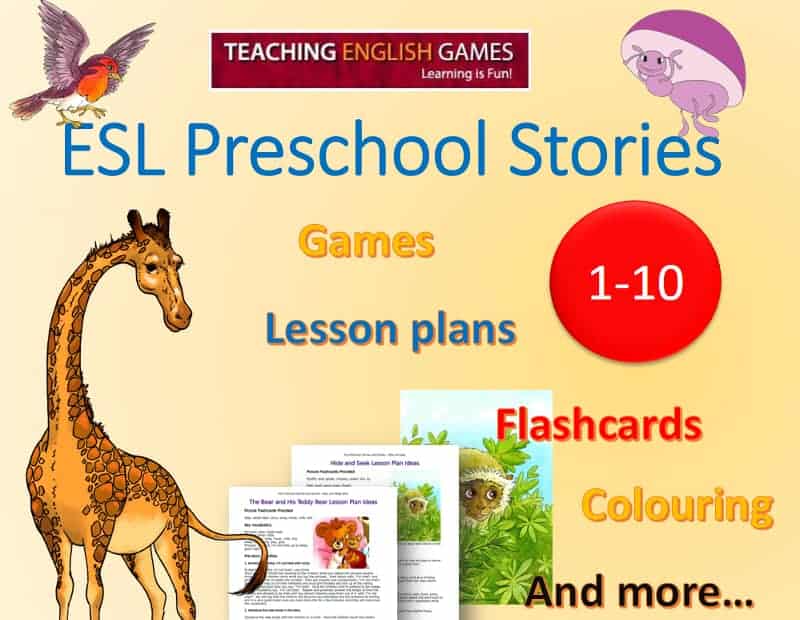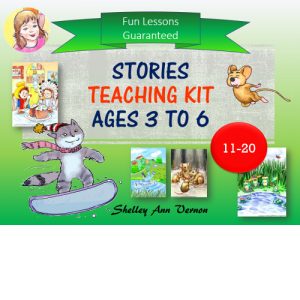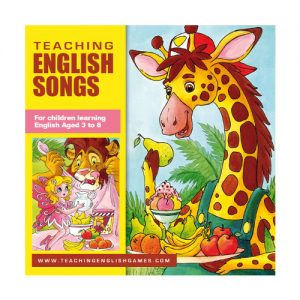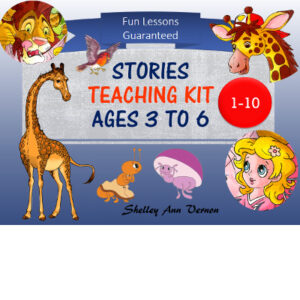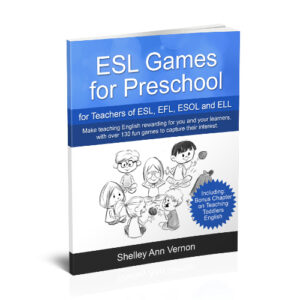It is worth teaching preschoolers English since they can learn a foreign language without really trying. They soak it up like a sponge! However, you as the teacher must facilitate the learning process and really make it happen. To do that, you need to know how to engage young learners.
Here are some of the social and personal developments you can expect to see in 3 to 5 years olds:
Has growing confidence personally and in the world
Has good imagination and likes to imitate adult roles, likes new and different activities
Is anxious to please and dependent on approval, love and praise
Is vigorous, full of energy and generally has an inability to sit still
Learns to share, take turns and accept rules
Has trouble concentrating and can mess around distracting other children
Shelley’s resources are ideal for dealing with the helter-skelter turbulence of young children at different stages of personal development and full of energy and enthusiasm.
Results you can expect
1. RAPID PROGRESSION ACROSS ALL LEVELS
Exhaustive research has shown that games, stories and songs are an effective way to teach young English language learners. Learning vocabulary in a playful context gives excellent results. Kids can use and remember words, though they need frequent revision. In essence, the more English is heard, the more likely the preschooler will acquire it.
Shelley’s ESL Games and Stories are full of interactive playful ideas in a natural learning context, with plenty of repetition.
2. MORE CONTROL IN THE GROUP OR CLASSROOM
Any class can be a mixed bag of children with different abilities, mood changes or attention spans. By chopping and changing the activity with Shelley’s co-ordinated games, story books and songs, preschool kids have many chances to learn the material.
When teaching preschoolers English, they may
- feel fearful,
- be going through their “silent period”,
- have short attention span of 5 to 10 minutes,
- be easily overwhelmed,
- simply not be keen to learn,
- and forget things quickly.
Shelley’s resources have enough variety to switch between active participation with listening, or excitable games to quiet ones. This method encourages the insecure and timid, yet stretches those children more willing to learn. Having such a choice at your fingertips puts you ahead of the game. In addition, you can anticipate changes with confidence having a battery of activities to suit the mood or the occasion and keep your preschoolers engaged.
3. IMPROVED COOPERATION WITH OTHER CHILDREN
Teaching preschoolers English through games takes advantage of their blossoming imagination, their enjoyment of new and different activities and introduces some discipline in a fun way. Preschoolers now have to learn the benefit of taking turns, sharing and accepting rules in a constructive and not a competitive way, which can lead to tantrums, stress….and chaos. ESL Games provide the ideal focal point for them to learn how to happily interact and cooperate with other children.
Words combined with action are recalled and remembered quicker, as children learn words best in a meaningful context. Games make learning fun so your class and children are willing participants and not just there because they have to be. With over 100 ESL Games to choose from you will never be stuck for an idea.
4. IMPROVED TEACHER-CHILD RELATIONSHIP
Preschoolers want to please, and eagerly seek approval and praise from the new adult in their lives. Games require an active involvement from you the teacher and that interaction with the children is so important . Why? Research tells us that a close relationship between a teacher and her school children gives significantly superior results in learning and language development.
Creating a relaxed and friendly atmosphere where you are actively involved with your charges through ESL Games will make your life easier and the lessons more enjoyable and productive.
Teaching preschoolers English tips
1. VARIETY IS THE SPICE OF LIFE
- Chop and change your games and activities every 5-10 minutes. This is vital because preschool children need variety as they get bored easily and have a very short attention span.
- Vary the pace during the lesson, mixing up excitable games with quiet ones. You do not want your children getting bored but you do not want them getting over-excited either, so vary the pace according to the mood and keep the children on their toes but not over the top.
- Use chants, rhymes and songs. These are great for movement and frequent repetition of vocabulary and phrases. Check the CD of songs that goes with this programme.
- Mix up active participation and listening. If the children become restless do something active.
- Be flexible. If something is not working, then change the game or activity
- Repeat, review and revise. Use short games to review vocabulary and phrases you have taught earlier in the term and the year. If you neglect this, the children will have no recollection of the language you have covered!
2. TEACHING GUIDANCE NOTES
- Avoid abstract concepts and concentrate instead on concrete real items that the children understand and relate to. For example start with familiar topics such as colours, numbers, greetings, animals, fruit, food and drink, families, body parts, shapes, clothing, the weather, days of the week and short everyday sentences and phrases. Teaching these topics using games will engage your preschoolers considerably more than learning phonics and the alphabet!
- Repeat, review and revise. Use short games to review vocabulary and phrases you have taught earlier in the term and the year. If you neglect this, the children will have no recollection of the language you have covered!
- Concentrate on speaking practise, starting with single words and short phrases, and gradually moving onto longer sentences and questions.
- Focus on listening and understanding, building vocabulary and the acquisition of short phrases.
- Avoid competition with preschool children. It can be stressful and overwhelm them. Play games where everyone wins, and where you do not single out a winner.
- Use please, thank you and be positive. Rather than telling children off and telling them what not to do, focus on positive behaviour. If Pedro is interrupting Jane, look at Jane and say, “I am listening to Jane now”.
3. NURTURING YOUNG MINDS
Encourage and support your young learners. Never tell them they cannot do it, they are no good at it or that they have failed. You could put them off wanting to learn English for life.
Teach in a relaxed and friendly atmosphere with plenty of encouragement.
Make your lessons playful and full of physical movement. The children will enjoy them more, be more motivated and remember the language better.
Involve shy or reticent children – give them a participative role and help them come out of their shell.
Shelley’s Personal Message
I have seen parents and teachers ruin a young child’s enthusiasm for learning English by having unrealistic expectations, by nit-picking over pronunciation and by going about teaching the wrong way. Some teachers (and many parents) try to teach children by saying a word and forcing the child to repeat it. The child does this once but is immediately corrected for bad pronunciation. Somewhat dampened the child tries again. But after a few more attempts boredom and discouragement have set in, and from that point on, English is considered a difficult and boring topic. So be sure to teach your preschool children in a fun way, with lots of games and encouragement, and you are sure to be a success. I’m here to help you if you need me. Just drop me an email – I answer every single one.
-
Preschool
ESL Preschool Stories 11-20 Teaching Kit + PowerPoints
Rated 0 out of 5€39.97Original price was: €39.97.€29.33Current price is: €29.33. Add to cart -
Preschool
Songs 1 (audio + video + masks + activities)
Rated 0 out of 5€19.97Original price was: €19.97.€9.97Current price is: €9.97. Add to cart -
Preschool
ESL Preschool Stories 1-10 Teaching Kit + PowerPoints
Rated 0 out of 5€39.97Original price was: €39.97.€29.33Current price is: €29.33. Add to cart -
Games
Preschool games book
Rated 0 out of 5€19.97Original price was: €19.97.€11.97Current price is: €11.97. Add to cart
Teaching Preschoolers English Paperbacks
Get Shelley’s books and stories in paperback from Amazon here: Shelley Ann Vernon Author Page.
